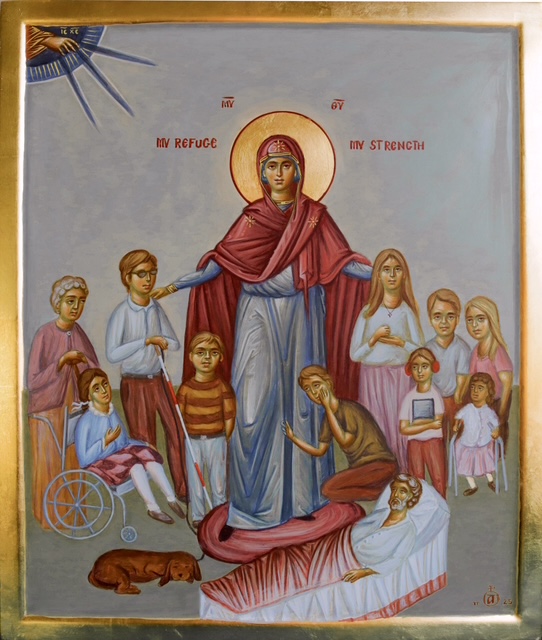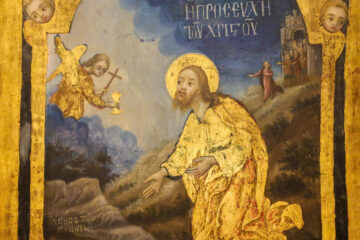In Orthodox parishes across the country, faithful Christians with physical, intellectual, and sensory disabilities often find themselves on the margins of worship and parish life, not due to a lack of faith, but because the structures—both physical and cultural—fail to include them. This week, a groundbreaking conference aims to change that.
Gathered as One Body
The “Gathered as One Body” conference (May 1-3 in Massachusetts) is an event dedicated to fostering accessibility and inclusion for people with disabilities within the Orthodox Church.
The program will begin tomorrow evening (May 1) at the Taxiarchae Greek Orthodox Church in Watertown MA and continues on Friday and Saturday (May 2–3) at St. Demetrios Greek Orthodox Church in Weston MA. The entire proceedings, including presentations, workshops, services and discussions, will be livestreamed and recorded.
[Live streaming: Taxiarchae, Watertown | St. Demetrios, Weston]
Forming the Conference
“Gathered as One Body” was conceived and organized by the Huffington Ecumenical Institute at Hellenic College Holy Cross, under the leadership of Rev. Dr. John Chryssavgis, with the goal of raising awareness on issues related to disability and improving accessibility in Orthodox churches and communities. The planning efforts were joined by the GOARCH Center for Family Care, and the Assembly of Bishops alongside the Orthodox Deaf Association.
The Conference will highlight the official launch of “On Behalf of All: Toward an Accessible Divine Liturgy for Children with Disabilities,” a pilot program funded through the Lilly Endowment’s Nurturing Children Through Worship and Prayer Initiative, which will provide training and support to select parishes as well as gathering together experts and members of the community to create resources and best practices moving forward.
“We do not have to reinvent the wheel. We simply have to exercise humility and charity, along with genuine willingness to be more open to learning from and being guided by others, especially from people who experience or encounter such challenges on a daily basis.” —Fr. John Chryssavgis
Practical Resources for Parishes and Individuals
More than 130 people are expected to attend the event in person, and thousands more will be able to join virtually. In addition to the opportunity to share experiences with fellow participants across the weekend, attendees will gain practical resources through presentations by specialists in theology, spirituality, and pastoral ministry. According to Presvytera Melanie DiStefano, resource developer for the Greek Orthodox Archdiocese Center for Family Care and director of the “On Behalf of All” initiative, these resources will include:
- Ministry models for accessible church school, youth ministry efforts, and career opportunities;
- Workshops on providing practical support and tools; and
- Best-practice sharing from parishes whose ministry efforts have created cultures of accessibility and inclusive opportunities.
Hierarchs will also address participants and respond to their concerns, and the Divine Liturgy will be celebrated in a manner that will palpably include individuals with disabilities, featuring a specially commissioned icon entitled “Panagia: My Refuge and My Strength.”
Not About, but WITH, our Disabled Community
Key to both the conference and the pilot program is an understanding that people with disabilities, visible or invisible, should not be talked about, but actively included in the conversation.
“It became very obvious from the outset that we should not organize a conference addressed to individuals with disabilities, but rather a more inclusive event organized by and for people dealing with disabilities in their lives and parishes,” says Fr. Chryssavgis.
“So, our organizing committee—which itself is inclusive of individuals with disabilities, as well as carers, clergy, and professionals—decided that the venue could not be Holy Cross School of Theology, which is sadly inaccessible to most people with disabilities. Indeed, many of our parishes and some of our Metropolises remain inaccessible. Even our Archdiocese is physically inaccessible. Still more unfortunately, our Ecumenical Patriarchate is also inaccessible to wheelchairs. How can we honestly claim to be a church of communion when so many of our faithful cannot enter our doors, let alone participate fully in our sacramental life? Simply put, whenever and wherever the church remains closed or inaccessible to people with disabilities, we betray our very identity as the Body of Christ.”
The Future of Inclusivity
This conference aims to be the first step toward organizing smaller local events at the Metropolis, region, and parish level. With the Archdiocese and the Assembly of Bishops involved, the effort promises to transcend regional and jurisdictional boundaries.
Among the desired outcomes is that parishes will be assisted in transitioning from mere awareness of disability issues to full inclusion of individuals with disabilities, with a focus on creating more sensitivity toward invisible disabilities.
A Need for Change
Accessibility concerns too often begin and end with physical access, which is, organizers acknowledge, important and still lacking. However, this narrow view often overlooks the needs of those with less visible disabilities, including Autism, ADHD, sensory processing differences, and mental health conditions. Without personal experience, clergy and parishioners may not recognize the barriers these individuals face, or the ways church culture can unintentionally exclude them from worship, education, social life, and leadership roles.
Pres. DiStefano hopes that the conference will broaden the conversation around disability in the Orthodox Church by building bridges of connection between parishioners with disabilities and those who seek to support them, with the goal that these conversations will spill out into discussion and action nationwide at the parish level.
“Many faithful Christian disability advocates have been striving for decades to shed light on the needs for accessibility and to dispel cultural stigmas associated with human vulnerabilities. This conference gives us the opportunity to unite with the common goal of creating understanding, of educating about the seen and unseen barriers that exist which hinder all members of Christ’s Body from being fully incorporated into parish life, and offering time-tested methods which create accessibility.”
Learn more about the “Gathered as One Body” conference and the “On Behalf of All” initiative at the Archdiocese website: GOARCH.org. Look for more conversations with program organizers and “On Behalf of All” parish representatives coming soon to OCN!




0 Comments